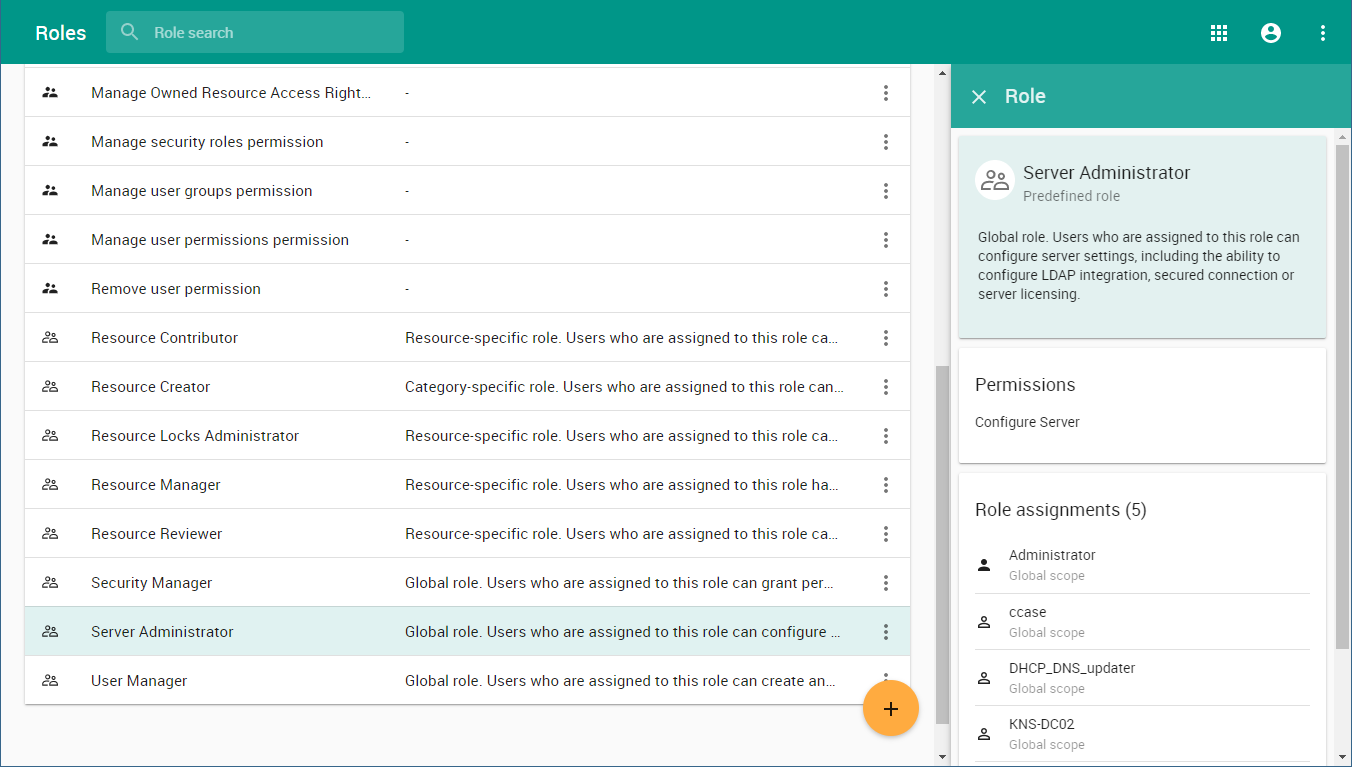On this page:
A permission in Teamwork Cloud is an approval to perform a particular task or access one or more data or resource objects in the system. Permissions are associated with roles. A role contains a set of permissions allowing a user with that role to perform specific tasks or work on a resource. For example, a Resource Contributor role has permissions to edit, read resources, or edit resource properties. The permissions enable that role to perform specific operations that are forbidden to other users.
Assigning permissions
You cannot directly assign permissions to a user. You must assign permissions to a role first and then assign the role to a user.
When you select a role in the Roles application, you can see its details and the permissions assigned to it. The figure below shows the permissions of the Server Administrator role.
The details of the selected role are displayed on the right-hand pane of the Roles application.
The table below describes all default roles and their permissions.
| Role | Permissions | Description | Scope |
|---|---|---|---|
| Resource Contributor | Edit Resources | The user with this permission can edit the resource contents. This includes the ability to change or augment the model. | Global/Resource specific |
| Edit Resource Properties | The user with this permission can edit resource properties, or change the name or description of the resource. | Global/Resource specific | |
| Read Resources | The user with this permission can read the resource contents. This includes the ability to open and review models. | Global/Resource specific | |
| Resource Creator | Create Resource | The user with this permission can create resources. This also includes the ability to add resources to the server. | Global/Category specific |
| Manage Categories | The user with this permission can categorize resources, including the ability to create, delete, or edit existing categories. | Global/Category specific | |
| Resource Locks Administrator | Read Resources | The user with this permission can read the resource contents. This includes the ability to open and review models. | Global/Resource specific |
Release Resource Locks | The user with this permission can release other users' locks in a resource. | Global/Resource specific | |
| Resource Manager | Administer Resources | The user is required to also have the Edit Resources and Edit Resource Properties permissions to enable listed actions, otherwise the resources will be read-only. The user with these three permissions can:
| Global/Resource specific |
| Edit Resources | The user with this permission can edit the resource contents. This includes the ability to change or augment the model. | Global/Resource specific | |
| Edit Resource Properties | The user with this permission can edit resource properties, or change the name or description of the resource. | Global/Resource specific | |
List All Users | The user with this permission can see all users. | Global | |
| Manage Model Permissions | The user with this permission can manage model-level permissions. This permission automatically includes the List All Users permission. | Global/Resource specific | |
| Manage Owned Resource Access Right | The user with this permission can manage resource-specific access rights, including the ability to grant or revoke user roles in the limited resource scope. This permission automatically includes the List All Users permission. | Global/Resource specific | |
| Read Resources | The user with this permission can read the resource contents. This includes the ability to open and review models. | Global/Resource specific | |
| Remove Resource | The user with this permission can delete resources. | Global/Resource specific | |
| Resource Reviewer | Read Resources. | The user with this permission can read the resource contents. This includes the ability to open and review models. | Global/Resource specific |
| Security Manager (global role) | List All Resources | The user with this permission can see all resources and access them. | Global |
| List All Users | The user with this permission can see all users. | Global | |
| Manage Security Roles | The user with this permission can manage roles, including the ability to create, edit, or delete roles. | Global | |
| Manage User Permissions | The user with this permission can manage user-level permissions, including the ability to grant or revoke roles in unlimited scope. | Global | |
| Server Administrator (global role) | Configure Server | The user with this permission can configure server settings, including the ability to configure a secured connection, LDAP connection, and manage server licenses. | Global |
| User Manager (global role) | Create User | The user with this permission can create new server users. | Global |
| Edit User Properties | The user with this permission can edit user details. | Global | |
| List All Users | The user with this permission can see all users. | Global | |
| Manage User Groups | The user with this permission can manage user groups, including the ability to create, edit, or delete user groups. | Global | |
| Remove User | The user with this permission can delete users. | Global |
Important
- If a user with the Resource Creator role creates a resource, that user will be assigned as the Resource Manager for that particular resource.
- To be able to read-write resources, the user must have the Read Resources, Edit Resources, and Edit Resource Properties permissions. Otherwise, the user will see resources as read-only.
Related pages:
